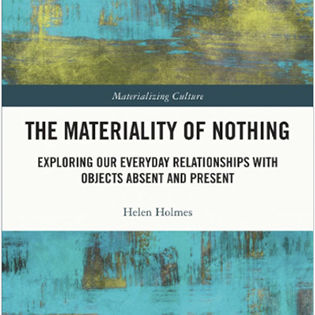Mundane materialities of nothing: the affinities and disruptions of invisible, hidden and transient things
- Location
- Arts Building, room 105
- Dates
- Wednesday 26 March 2025 (13:00-14:30)

We will be welcoming Helen Holmes (Sociology, University of Manchester) to campus to discuss her recently published book The Materiality of Nothing: Exploring Our Everyday Relationships with Objects Absent and Present (published with Routledge in 2023).
The book explores invisible, intangible and transient materials, as well as objects of everyday life and the relationships we have with them. It builds on growing research on the everyday and unites the established field of material culture and materiality with emerging sociological studies exploring notions of nothing and the unmarked. The book also engages with issues of sustainability and consumption, raising questions regarding society’s increasing need for material accumulation and posing some alternatives.
In this paper, Helen will be drawing on over 15 years of research exploring the mundane materialities of everyday life. How objects structure our daily lives is well documented – with work from scholars of consumption, materiality and material culture illuminating their agency, potency and power. In her own work, she pays homage to Mason’s (2008, 2018) wider work on affinities to explore the connective power that everyday objects have and the ‘material affinities’ they enable. Yet Helen has always felt that work on materiality fails to fully capture the extent of our relationships with material things – and, particularly, material things which are no longer in our possession or for a variety of reasons may be invisible, hidden or intangible. Drawing on Scott’s (2019) concept of nothing, Helen’s research has sought to illuminate the potency and performativity of the objects and materials of nothing, including the absent presence of lost yet cherished objects, the potency and persistence of invisible materials, and the shape-shifting, transient qualities of others. In this presentation, Helen will focus on how the materialities of nothing can disrupt – from the imagined other woven into second-hand objects, to the material disconnect we experience when an object is no longer viable, to the collective loss we experience when an object of historical or cultural significance is destroyed. Helen argues that mundane material affinities of nothing play a crucial role in our relationships with others, inextricably binding us to other people, places, times and things. In turn, understanding these relationships is critical if we are to tackle society’s unsustainable over-reliance on ‘stuff’.